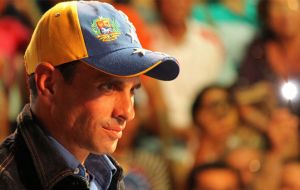MercoPress. South Atlantic News Agency
Venezuela opposition leader says Chavez not obliged to take the oath 10 January
 Henrique Capriles understands that the president-elect can also take the oath before the Supreme Court
Henrique Capriles understands that the president-elect can also take the oath before the Supreme Court The Venezuelan government and opposition coincide that it is possible to postpone the oath taking ceremony of President Hugo Chavez, which according to the constitution should take place on 10 January, if the re-elected leader is still in Cuba recovering from his fourth cancer operation.
“The Constitution is very clear: the president at this moment is on a constitutional leave, voted unanimously by the National Assembly, so he can address his health situation. If that leave is to be extended beyond 10 January, the constitution comes in and he will surely have to take the oath later, before the Supreme Court”, said Vice-president Nicolás Maduro.
“At the precise moment the medical team so indicates and there are possibilities, the president will then take the presidential oath”, added Maduro following a mass in downtown Caracas for the health of Chavez.
Last 11 December Chavez flew to Cuba for his fourth cancer operation in 17 months. But following surgery and without a date for his return to Caracas, a debate surfaced as to whether the incoming president’s oath before the National Assembly could be postponed or not.
This week the head of the opposition Henrique Capriles, who lost to Chavez last October, came closer to the government’s position and accepted the possibility that the oath ceremony could be delayed.
“We must be very serious and transparent, a person does not lose his condition of president-elect if he can’t take office the day established”, said Capriles.
“If the president of the republic can not show up on 10 January to take the oath in his condition of president-elect, the Constitution has the replies to such a situation. First we would have a temporary absence and only after would the Constitution be implemented if the absence becomes absolute” underlined Capriles who recently confirmed his leadership of the opposition by winning the governorship of Miranda.
Under the Venezuelan constitution there are temporary presidential absences of 90 days that can be extended for an only time another 90 days, during which period the Vice-president takes office. But there are also absolute absences, which must be decreed by the National Assembly, which refer to death, resignation, removal or physical or mental incapacity.
If the absolute absence is voted before the president–elect takes office or in the first four years of government, presidential elections will have to be anticipated in the following thirty days.
The 1999 constitution under article 231 states that the president must take the oath of office before the National Assembly on 10 January. But likewise if “for any motive” he can’t take the oath before the Legislative branch, he can do so before the Supreme Court, but with no time limit established.
With his statement Capriles takes distance from the opposition coalition Democratic Unity Table which had indicated that the January 10 date is a deadline that can not be postponed and if Chavez did not turn up on that date, “an absolute absence” would have to be declared.
Meanwhile Vice president Maduro brought some relief by saying that Chavez was able to leave bed, to walk about and do some exercises as part of his post-operative recovery program.
Chavez called Maduro from Havana, Cuba, where he underwent surgery, and “during the 20-minute conversation that we had, he was walking, doing some exercises that are part of his daily treatment,” Maduro told state-run VTV by phone.
News of the call from Chavez, which Maduro said was “a Christmas present,” sparked a flurry of hopeful messages on social networking site Twitter by Venezuelans loyal to the ailing head of state.
“Practically throughout the 20 minutes, about 15 minutes were given to instructions and orders on issues vital to the country's economy, social programs, the national program,” said Maduro.




Top Comments
Disclaimer & comment rules-

-

-

Read all commentsIt never cease to amaze me the maturity that is being shown by Capriles and the opposition. No matter how low Chavez and his government has attempted to drag political discourse in Venezuela, Capriles refuses to do the same.
Dec 27th, 2012 - 09:47 am 0Capriles is showing the maturity that people expect from a actual president not someone who lost the election. Let's hope it is reciprocated and emulated should the worse happen.
1 Anglotino
Dec 27th, 2012 - 02:11 pm 0Whilst agreeing totally with what you post, it highlights the inate stupidity of the supporters of the government.
Mature, well thought out comments are completely ignored when the name Chavez is uttered or written,
Perhaps it might change when he croaks it.
It always takes a while to rebuild a civil society after it has been so thoroughly corrupted and destroyed. The mindset is the hardest hurdle as many Soviet bloc countries found.
Dec 28th, 2012 - 01:02 am 0It will take at least 10 years to extradite the state from so many facets of the economy and society and as Colombia has found, only high growth and stability can reduce crime levels.
Venezuela could have been the Chile of the Caribbean. Smaller population than its neighbours Brazil and Colombia but much much richer. I'm not sure if it can catch up now. There is an acceleration of emigration out to the US, Australia and Colombia taking capital and talent with it.
Chavez's impending death (I'm not wishing, but it is hard to deny after so much treatment) will be the beginning of a very very long road.
Commenting for this story is now closed.
If you have a Facebook account, become a fan and comment on our Facebook Page!